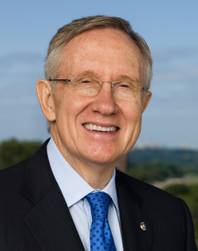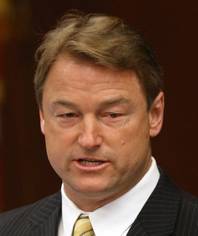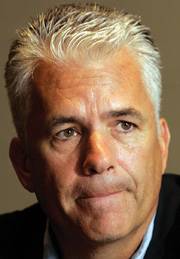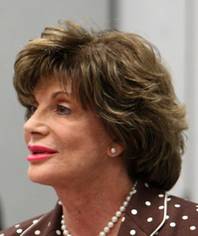Thursday, Dec. 16, 2010 | 2 a.m.
Sun coverage

Harry Reid

Dean Heller

John Ensign

Shelley Berkley

Dina Titus
They asked for money for fuel, and money for schools. They’ve flagged dollars to improve Interstate 15, and support oral hygiene. And they’re keen on funding improvements for war and water.
The Senate Appropriations Committee released its list of earmarks awarded under the 2011 omnibus spending package Wednesday, and from a scan of the documents, it’s clear Nevada’s lawmakers know how to use their juice in Washington. Well — mostly.
The five-member delegation covers the spectrum of spending philosophies in Washington. At one end is Harry Reid, the Senate’s No. 1 Democrat, who according to numbers crunched by the Las Vegas Sun, received about $225 million in earmarks requested either individually, or with other members of the delegation.
That puts him among the top earners in Congress — although a far cry from Mississippi Republican Sen. Thad Cochran’s Congress-leading $560 million and Democratic Hawaii Sen. Daniel Inouye’s $421 million. It’s not a coincidence that Cochran and Inouye run the Appropriations Committee.
On the other end of the spectrum, you’ve got Nevada Republican Rep. Dean Heller, who got zero. On purpose.
Heller announced this fall that he would commit not to request earmarks in fiscal 2012, but he apparently ratcheted that up a notch, removing himself from the free-for-all in the 2011 fiscal cycle as well.
“The earmark process has become a symbol of the glut in our nation’s capital,” he said last month, urging lawmakers to support a Congresswide moratorium on earmarks. “Congress must rein in reckless spending.”
It’s a refrain echoed by several lawmakers in the past few weeks, as they have hashed over tax bills and strategies to fund the federal government. Lawmakers such as Sen. Tom Coburn, R-Okla., have led the fight that has focused on capping spending first: He served on the president’s Debt Commission, voting for a proposal that would raise taxes and reduce entitlements in the name of bringing down the federal debt, and was the chief sponsor of an amendment to the tax bill, considered Wednesday, that called for offsets.
His co-sponsor, Nevada Republican Sen. John Ensign, has also railed against runaway spending, taking to the Senate floor Tuesday to call for offsetting expenditures with budget cuts, and reduction of federal spending levels to what was on the books in fiscal 2008.
But in this bill, Ensign sponsored his fair share of earmarks. It doesn’t necessarily mean he’ll vote for the bill, but in total, Ensign lent his name to almost $85 million worth of funding requests, most of them in the areas of military/defense and energy/water.
Rounding out the pack were House Democrats Shelley Berkley and Dina Titus, who requested $56.4 million and $54.4 million, respectively.
The debate about the efficacy of earmarks rages every year in Washington and played itself out in a bonus round in Nevada this year during the election.
On one side are lawmakers such as Heller, taking a principled stand against spending.
But that doesn’t mean the pro-earmarking side is devoid of principle. They say the projects are necessary to keep development going in the state and create jobs.
“Failure to pass this legislation would cut off paychecks, resources and vital services for hundreds of thousands of Nevadans right before the holidays, which would be harmful not only for our economy but for our national security,” Reid said.
There is, in fact, a ticking clock aspect to this. The government’s only been funded through Dec. 18 — meaning that’s the deadline to pass a bill, or contend with a shutdown. The race to the finish only adds to the passions that surround spending bill debates.
Although earmarks this time total more than $2 billion, that’s a drop in the bucket in a $1.1 trillion federal budget — less than
1 percent of the total.
It should be noted that there’s a little wiggle room in Nevada’s numbers.
Some projects, such as $67 million for flood, wastewater and conservation management projects for the Truckee River and the Walker River Basin, are wholly tied to Nevada.
But a significant portion of the requests are much broader geographically. Reid and Berkley are among dozens of lawmakers who banded together to request money for national programs promoting writing and reading, but only a small fraction of the dollars requested would ever come to the state.
If those national numbers were included in the charted totals, Berkley’s request pot would rocket up to more than $137 million, dwarfing Ensign’s total, and Reid’s would be above $250 million.
Ensign and Titus did not join in on national project requests.
At the same time, not all defense requests made by various lawmakers — especially Reid — will necessarily find their way back to Nevada. Because it’s a funding bill with a high likelihood of passage, it falls to Reid to make requests that are left hanging on the Democrats’ agenda, whether or not all requests directly benefit the security interests of the state.
So what are the biggest, most interesting pieces of the pie? Well, almost $20 million is earmarked for energy and water infrastructure construction in rural Nevada — some that Reid and Ensign asked to have included. And there is
$23 million for a military field maintenance program in Las Vegas to serve the state’s Army National Guard units — a project the whole delegation, minus Heller, threw its weight behind.
Another interesting point to note — there may be no funding for the Yucca Mountain nuclear repository, but Reid sought extra insurance in the funding bill. He requested, and got, $2.5 million to pay for the site’s “shutdown.”

Join the Discussion:
Check this out for a full explanation of our conversion to the LiveFyre commenting system and instructions on how to sign up for an account.
Full comments policy